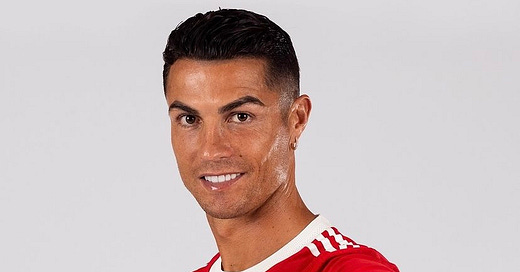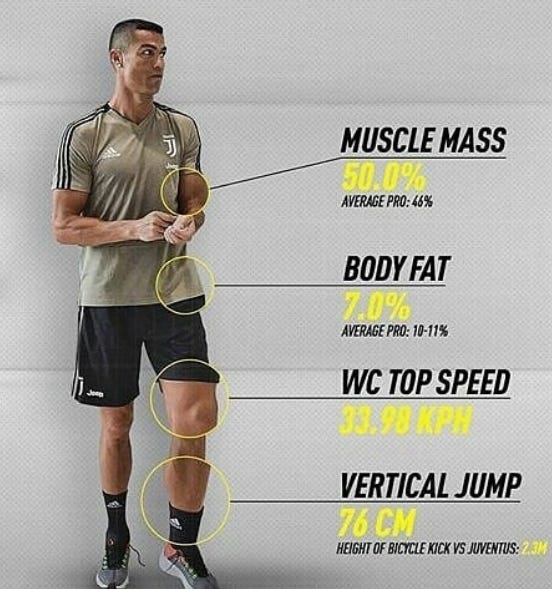A big week for the human performance and longevity space. Whoop a wearable tracker who’s CEO I had the honour to interview on my club on clubhouse raised 200 million to bring it’s valuation to a staggering 3.6 billion and 8sleep a company I am working as sleep performance doctor for took sleep fitness mainstream by raising 86 million bringing it’s valuation to half a billion. Founders like Matteo Franceschetti and Will Ahmed have a grand vision for the future of health and I’m excited to see it unravel.
Another big story is Ronaldo’s move to Manchester United at the age of 36. It has been stated that Ronaldo’s biological age is still in the 20’s.
Theories of Ageing-
Protein cross-linking theory
Free radical theory of ageing
Somatic mutation theory of ageing
Whilst we know genetics play a role in the rate of ageing a lot of ageing comes down to lifestyle.
I’ve signed up to a new app- ‘Humanity’ that promises to ‘slow your ageing’ and has raised 2.5 million from health investors.
Humanity uses algorithms and AI validated against real world outcomes from longitudinal biobanks. The app connects with sensors such as the apple watch and the oura ring to track heart rate, step count, sleep and provides you with a ‘Humanity score’.
The app aims to give personalised guidance for each individual to help slow down the ageing process. Sign up to my newsletter for me to send you a link to the app.
So why has Ronaldo aged so well/-
Exercise-
He works out for three hours every five days per week on endurance, speed, strength and movement.
‘Research has shown that people who have consistently high levels of activity have longer telomeres, which are caps at the end of chromosomes that shorten as you age. Adults with high physical activity levels (defined as 30 minutes of exercise five days a week) had telomeres that were nine years "younger" than those who are sedentary, a 2017 study found.
And cardio exercise appears to have a more robust effect on ageing than resistance. A 2018 study found that high-intensity interval (aka HIIT) and endurance training lengthens telomeres better than resistance training.’
Diet-
It’s also understood he favours a fish diet and doesn’t drink any alcohol whatsoever.
He eats a high protein diet, with lots of wholegrain carbs, fruit and vegetables, and avoids sugary food.
‘Lifestyle and diet have been identified as major risk factors in a number of diseases. The Mediteranean Diet, broadly accepted as a healthy eating model, is characterized by the high consumption of plant-based foods, olive oil as the main source of fat, low-to-moderate consumption of fish, dairy products, and poultry, low consumption of red and processed meat. Studies show that diets that emphasize vegetables, beans, whole grains, nuts, seaweed, fish and seafood, and limit sugar, meat, and processed foods are associated with longer telomeres.’
‘Eating at least 3 to 5 ounces of fish weekly, or eating no more than 3.5 ounces of meat daily, may provide considerable protection against loss of brain cells equal to about three to four years of ageing,” Gu of Colombia University.
Sleep-
The Portuguese ensures himself of eight hours of sleep every night.
‘A study done by UCLA researchers discovered that just a single night of insufficient sleep can make an older adults’ cells age quicker. This might not seem like a big deal, but it has the potential to bring on a lot of other diseases. Multiple sclerosis, heart disease and cancer are just a few of them.
‘A 2019 study examined data from the Women’s Health initiative on more than 3,000 post-menopausal women and found that every hour of additional sleep beyond 5 hours, telomere length was significantly longer. The researchers found that on average, women who slept less than 7 hours a night had telomere length that was equivalent to women who were 2 years older.’
Recovery-
Interestedly, he also uses a Cryotherapy chamber for muscle regeneration.
I thought I would take this straight from my friend and Co-host Louisa Nicola’s neuroathletics newsletter [which you should check out and follow her on twitter for the latest in brain health].
Louisa writes-
‘Cold increases mitochondrial biogenesis through a really straightforward mechanism. Mitochondria are able to create heat as a byproduct of energy production.
Here's how it works...
Cold exposure activates a gene called PGC1α, which makes more mitochondria in the muscle. This is referred to as mitochondrial biogenesis and PGC1α is the master regulator of this process.
What is the protocol for this?
1 A study showed that a single 15 minute exposure to cold water (50°F or 10°C) increases PGC1α in muscle tissue.
2 But also another study showed that men who were immersed in cold water at 50°F (10°C) for 15 minutes 3 times a week for four weeks were able to increase mitochondrial biogenesis occurring in their muscle tissue.
While it is evident that both exercise and cold exposure independently induce PGC-1α and mitochondrial biogenesis, the interaction between exercise and post-exercise cold water immersion on mitochondrial adaptations is unclear and has been the subject of much debate.’
‘Increased longevity via cold-exposure could be due to hormesis. Hormesis refers to the paradoxical adaptation that makes animals stronger and more efficient if they are exposed to environmental stresses [25].
Other researchers prefer the ‘rate of living hypothesis’. This theory suggests that lower temperature promotes longevity by slowing down the rate of reaction of various metabolic processes. This means fewer by-products of metabolism, such as reactive oxygen species (ROS) [6].
Alternatively, increased longevity from cold exposure may be due to a modulation of genes, such as TRPA-1 and DAF-16’
Code - HBC for discount on 8sleep products
https://www.eightsleep.com/





